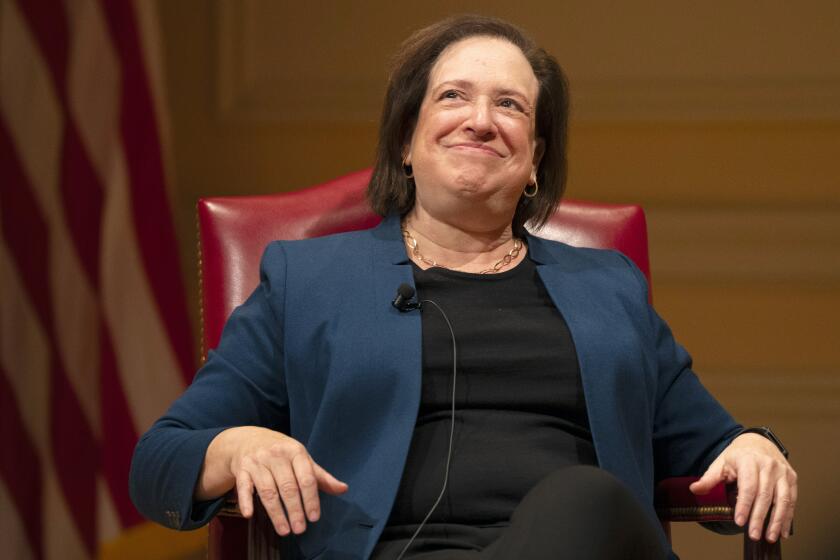Maternity Law Delivers a Headache to Hospitals
After Gov. Pete Wilson signed into law a bill requiring medical insurers to cover at least 48 hours of hospital care for mothers and their babies after a normal birth, hospitals immediately heard some cries.
“We actually had [maternity] patients who came in the next day and said they’d called Sacramento to see if they could stay an extra day,” says Paula Cover, an administrator at Pasadena’s Huntington Memorial Hospital.
Maternity patients who have heard of the new law--intended to protect mothers and babies from being kicked out of the hospital in 24 hours or less--might assume that it automatically applies to them. Indeed, the bill went into effect immediately after the governor’s signing on Aug. 27.
But it’s not quite as simple as that.
Two months later, a little-known provision of the maternity law is causing confusion among patients and headaches for hospitals and insurers. The problem is that the law’s effective date is different for different people.
The so-called drive-through-delivery law requires health plans to cover longer maternity stays--at least 48 hours for normal deliveries and 96 hours for a caesarean section--only after the date in which the patient’s medical insurance contract is issued or renewed, after Aug. 27. For example, if a patient is insured through her employer and the employer’s contract with her health plan is renewed on March 1, 1998, then the law doesn’t go into effect for her until that date.
*
So the maternity legislation will actually be phased in through 1998, depending on the specifics of a patient’s individual or group health policy.
“This is extremely confusing for the consumer,” says Jim Lott, senior vice president of the Healthcare Assn. of Southern California, a trade group for hospitals and other health-care firms. “You have moms thinking the longer maternity stays are an entitlement . . . which she may not actually have yet.”
Although the law requires health insurers, not hospitals, to cover longer maternity stays, hospitals say they are catching most of the flak from confused parents.
“The hospital definitely looks like the bad guy in this,” says Debbie Noble, a nursing manager at Providence St. Joseph Medical Center in Burbank, noting that the hospital has to inform women that the law may not yet apply to them.
Earlier this month, the Healthcare Assn. issued a memo to hospital chief executives advising that the maternity law has been “misinterpreted with the potential to erode patient and physician relations and adversely affect hospital finances.”
To limit confusion, some hospitals have begun sending notices to pregnant women that explain the maternity law. They encourage patients to contact their health plans or employer benefits departments for information about their insurance contracts.
The notices--drafted by the hospital trade group--also tell women that the law does not necessarily guarantee them a longer maternity stay. The law says that decisions about whether a mother and newborn will stay in the hospital for 48 or 96 hours should be made by the treating doctor “in consultation with the mother.”
Of course, the law allows mothers and babies to go home earlier than that if the mother chooses to. But it requires that the health plan cover a follow-up visit within 48 hours after the mother is discharged, to include parent education, training in breast- or bottle-feeding and a health assessment.
Hospital officials say a few insurers are amending their coverage to comply with the maternity law before the required dates. One such plan is PacifiCare of California. Company spokeswoman Susan Whyte Simon said the HMO began allowing its members the longer maternity stays in late August.
Maternity Program
Hospitals are worried that the maternity-stay law could pose a financial burden if insurers don’t adjust fees to account for the longer stays. Many health insurers pay hospitals a flat fee for maternity services, which means the hospital doesn’t get paid more if the mother stays longer.
“In a market where there is an oversupply of hospitals, it gives the health plans a lot of leverage” to demand discounts for maternity services, Lott says. “I don’t see the insurers adjusting their fees for this new law, and the hospitals will have to take it on the chin.”
Such financial concerns, as well as hospitals’ interest in ensuring that mothers leave the hospital as happy consumers, is prompting some innovation.
For example, Santa Monica-UCLA Hospital plans to offer a “doula” program for mothers who choose not to stay an extra day. The hospital has contracted with Tender Care, a doula-referral service.
Doulas are women who are certified to assist women both during labor and in the days after birth. For example, they may help train mothers in proper breast-feeding or bathing techniques, or give exhausted parents a breather by helping out with basic household tasks such as fixing dinner.
The Santa Monica hospital plans to offer mothers a choice of staying an extra day or going home sooner with eight hours of hospital-paid doula service. Some other hospitals that either already offer or plan to offer doula programs are Providence St. Joseph, Little Company of Mary Hospital in Torrance and San Pedro Peninsula Hospital.
*
David Olmos can be reached by e-mail at david.olmos@latimes.com or by fax at (213) 237-7837.
More to Read
Get the L.A. Times Politics newsletter
Deeply reported insights into legislation, politics and policy from Sacramento, Washington and beyond. In your inbox three times per week.
You may occasionally receive promotional content from the Los Angeles Times.






